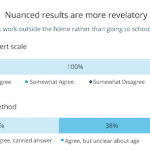Banking on the Unbanked: Assessing True ‘Creditworthiness’
Since March 2016, Colibrí has provided over 1,000 solar home energy solutions to rural, off-grid households in Nicaragua via Colibrí Fácil-Pago, our pay-as-you-go solar home financing service, powered by Angaza Design.
Our default rate is less than 2 percent. Sixty-five percent of our customers are ahead of their payment schedules. Over 90 percent of customers who apply for the financing are approved. Most customers pay off the system in under nine months, instead of the allowed 12. I’d like to talk about why.
Colibrí solar home systems provide lighting, cell phone charging and TV viewing (if the customer opts in). The total cost is $206. Customers’ monthly income is between $30 and $300, depending on the season, the harvest and other miscellaneous work opportunities. Income is unpredictable and irregular. The primary income-generating activity is agriculture.
The customer’s cash flow rarely permits a one-time payment of $206. Colibrí Fácil-Pago allows customers to finance their purchase for up to one year and make flexible payments on a schedule that works with their cash flow. The added benefit is that Angaza’s technology allows Colibrí to control the systems: Customers enter activation codes (generated with each payment) to use the system during the financing period. If they don’t make a payment for a while, the system “locks” (shuts down) until they make another payment. Once they pay the full value, the system is unlocked.
We, arguably, are providing credit in the most challenging market in the world. Sixty-six percent of our clients have not had any previous formal credit or finance experience. Zero percent have a bank account. The list of challenges includes remote, occasionally illiterate, low-tech, no formal income, no formal financial experience, no credit scores – in other words, the unbanked market.
We built a robust credit-vetting process for Colibrí Fácil-Pago. It collects information on income, expenditures, debt, the community, psychometric indicators, etc. It is administered by the salesperson and takes 15 minutes. The following factors have been most useful for us in predicting creditworthiness for Fácil-Pago.
1. In the credit assessment, the “how” is more valuable than the “what”
We are proud to say that we don’t have a minimum income requirement to qualify for Fácil-Pago. That would defeat the point of being financially inclusive. In fact, we don’t pay too much attention to the number response for “monthly income” (we measure for the past three months). Instead, we care about how long it took them to respond and how/why they justified it. We care less about how much they’re spending per month on rice, beans, oil, sugar, etc., and care more about whether they even know how much they’re spending.
Does the client demonstrate command over the household’s expenditures? Budget? Income? Are they organized with respect to income-generating activities? Do they plan for low-season months? Do they actively ask about interest rates and suggested monthly payments? In short, are they financially literate?
2. Credit analysts are critical for relationships and trust-building
The easiest way to assess the how instead of just the what is with a skilled credit analyst. Our analysts have several years of experience working in microfinance and lending, and have a strong intuition for assessing payment capacity and creditworthiness. They can spot the things that are too complicated or random to quantify, such as a client’s confidence, the way they treat their partner and neighbors, and their personal goals.
For example, one of our analysts approved a client who said he was going to borrow the $40 down payment (required for the installation) from a friend in his community. His harvest hadn’t come as soon as expected but he didn’t want to delay the solar installation for his family. I questioned the officer’s judgment for approving this customer. If he didn’t even have the down payment, why did we think he would keep up with his other payments? The officer explained his reasoning: If a neighbor of the same socio-economic status was so willing to lend to him, it indicated the client was responsible and trustworthy, thus creditworthy. He was right and the client paid just fine.
While this might not be the case every time, it’s an example of how a face-to-face interaction led to a positive assessment. A survey on its own would have missed this and the customer would have been excluded from making a life-changing investment. A strong credit officer that notices small details means we impact more people – that, to me, is financial inclusion.
And perhaps most importantly, credit analysts know how to tap into #3.
3. Use the community’s existing informal credit-vetting strategies
The unbanked usually already have a credit “score.” You just need to know where to look. Think about it: You’re not the first person in the community to offer something on a payment plan. Chances are, someone else has data on your potential customer. Check with longstanding community vendors. Most households have or have had a payment arrangement with the local shop. In fact, many community members just have an ongoing tab that they pay weekly, bi-weekly, or monthly. The vendor can tell you who pays and who doesn’t (make sure to do it in confidence and in a professional manner). This is our most useful strategy.
4. Take yourself seriously and the customer will, too
There are a lot of players out there: microfinance lenders, predatory lenders, sales scams, major fast moving consumer goods distributors –your service isn’t going to be the first credit/financing sales pitch your customer is hearing. Present yourself seriously, represent the company seriously, pitch your product seriously, and take customer service seriously.
We believe Colibrí’s ability to activate/deactivate the solar home systems (via Angaza) gives a “wow” factor to our service. In fact, I often think that this “wow” factor is more influential in keeping customers paying than the actual deactivation of the system. Just our ability to do it gives us a high-tech, serious image, which makes the customers take the financing seriously. It may seem obvious, but this presentation of professionalism, customer service, and organization goes far. We’ve found that it often leads to self-selection in the credit assessments – plenty of potential customers turn us down because they worry they can’t keep up with payments. We appreciate that honesty and responsibility – and it likely saves us a lot of time and money.
Morgan Babbs is the co-founder and CEO at Colibrí.
Photo provided by author.
Homepage photo: Adam Cohn, via Flickr.



